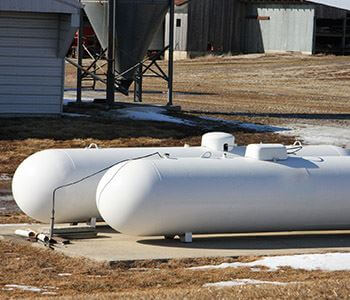Propane Leak Test Explained
Mar 16, 2020

With its low flammability rating, easy detection, inability to be ingested and high ignition point, propane is one of the safest options available to homeowners when choosing to heat their home.
Despite the low risk of harm, Co-Alliance is dedicated to the safety of you and your family and performs leak checks with a dedicated safety team in accordance with safety regulations. New customers and customers adding a new tank set will have this leak check conducted free of charge. Continue reading to find out more about this necessary safety procedure.
Remember, if you smell gas, don’t light an appliance! Turn off gas to the appliance, have everyone leave the residence and call Co-Alliance from a safe location.
Why Do I Need A Leak Check Exactly?
All propane piping, connections and fittings are threaded for ease during installation or modification. These propane connections are coated with a pipe joint compound that lubricates the fittings during the joining process and will dry after a short while. During normal usage, a propane plumbing system is at a constant pressure. This means if the tank has gas and is supplying the system with propane, a constant pressure is exerted on the piping and the pipe joint compound. The pipe joint compound will expand during normal pressurized usage and will retract if the system loses pressure. This loss of gas pressure may cause leaks to form because of the expansion and retraction of the piping compound within the propane plumbing system. The leak test will indicate any leaks within the propane piping system due to interruption of service or out of gas situation. The leakage test is simply testing the integrity of the system plumbing joints and the seal of the pipe joint compound. This is the safety reasoning behind leak testing.
When Should I Have a Leak Test?
Leak tests are required any time there is an interruption of service, meaning the flow of gas was stopped for any reason. NFPA 54 (2006), 8.2.3 states that "Immediately after the gas is turned on into a new system or into a system that has been initially restored after an interruption of service, the piping system shall be tested for leakage. If leakage is indicated, the gas supply shall be shut off until the necessary repairs have been made.”
Out of Gas = Empty Propane Tank = Required Leak Test
All too often, propane customers run out of gas when temperatures are the coldest. This is considered an interruption of service. No matter what the temperature is, if the tank is out of gas, a leak test must be conducted before propane can be added to the tank. It may not be convenient but it's the law and in the best interest of your safety.
How do you keep from running out of gas and having to wait for a leak check? Keep an eye on the tank gauge or place your account on an automatic delivery schedule. The Co-Alliance Keep-Full payment program puts your tank under automatic monitoring, so you’ll never have to worry about your propane consumption during heavy-use months. In the rare event that one of our Preferred Payment Plan or Keep-Full customer would run out of propane, there would be a pressure and leak check completed at no charge to the customer. Contact your local branch for information about placing your account on a Keep-Full delivery schedule.